|
 |
|
 |
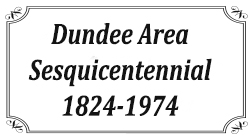
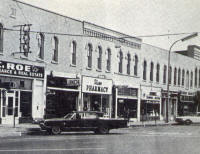 Dundee,
Michigan has played a major role in the lives of many of the Heiden, Rambow,
Roggerman and Getty families since the early ancestors arrived from Germany
and Ireland in the late 1800s. Dundee,
Michigan has played a major role in the lives of many of the Heiden, Rambow,
Roggerman and Getty families since the early ancestors arrived from Germany
and Ireland in the late 1800s.
The town was first settled by Europeans in
1824 and became incorporated as a village in 1855. By 1880, it had grown to
a population of 932 and by 2020, the village was home to 5,323 people. From
the 1950s to 2000, about 2,000 to 3,000 people lived in Dundee.
The village is nicknamed the "Hub of the
Highways" due to the intersection of major historic thoroughfares within its
boundaries (specifically present-day M-50 and the old U.S. Route 23).
Many of the people in the four families lived
in nearby Raisinville or Dundee Townships. From William and Mary Heiden's house at
8861
Dixon Road, it was about seven miles to Dundee. |
|
|
|
|
|
 |
|
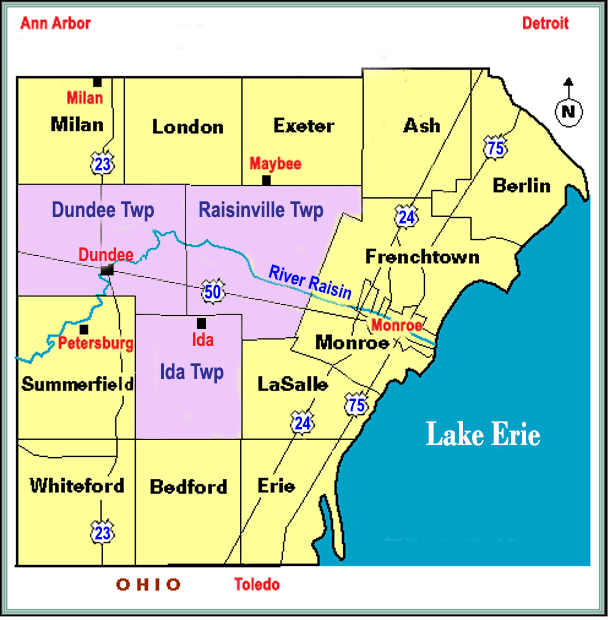 |
 |
|
Distance from Dundee (miles) |
|
 |
- Adrian - 22
- Ann Arbor - 29
- Britton - 9
- Deerfield - 10
- Detroit - 57
|
- Ida - 9.5
- Maybee 10
- Milan - 10
- Monroe - 14
- Petersburg - 10
|
- Shepherd - 149
- Tecumseh - 22
- Toledo, OH - 29
|
|
|
 |
|
|
 |
|
  Dundee
was home to a livestock auction and Karner's Elevator bought corn, soybeans and other
field crops. Farm equipment dealers such as Salenbien's International
Harvester dealer were located in town. Dundee
was home to a livestock auction and Karner's Elevator bought corn, soybeans and other
field crops. Farm equipment dealers such as Salenbien's International
Harvester dealer were located in town. |
 |
|
 |
|
  As
with any small community during the 1940s, 50s and 60s, the car and
everything to do with it was central to local life. Dundee had American
Motors (remember them?), Ford, Oldsmobile (they're gone too) and Chrysler
(Plymouth no longer exists) dealerships along with many gas stations and
mechanic shops. As
with any small community during the 1940s, 50s and 60s, the car and
everything to do with it was central to local life. Dundee had American
Motors (remember them?), Ford, Oldsmobile (they're gone too) and Chrysler
(Plymouth no longer exists) dealerships along with many gas stations and
mechanic shops. |
 |
|
 |
|
 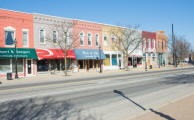 The
downtown area of Dundee was in a triangular form. In the center was a small
park with a gazebo and a large cannon. On the streets that made up the
triangle were hardware stores, a bank, grocery stores, five and dime stores,
barber shops and, of course, friendly local taverns. The
downtown area of Dundee was in a triangular form. In the center was a small
park with a gazebo and a large cannon. On the streets that made up the
triangle were hardware stores, a bank, grocery stores, five and dime stores,
barber shops and, of course, friendly local taverns. |
 |
|
 |
|
 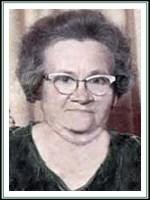 The
Village of Dundee and Dundee Township was home to at least 15 Heiden related families.
This would include people like Veyirl Wittop (right), Heinrich Rambow and
Ralph Raymond Roggerman. The
Village of Dundee and Dundee Township was home to at least 15 Heiden related families.
This would include people like Veyirl Wittop (right), Heinrich Rambow and
Ralph Raymond Roggerman. |
 |
 |
|
 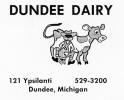 Over
the past several decades, we have accumulated a large collection of
newspaper advertisements pertaining to businesses in the Village of Dundee.
It is interesting to see what was going on over half a century ago when you
could buy a loaf of bread for 19 cents, a large banana split for 29 cents or
a new Rambler car for $1,795.00. Over
the past several decades, we have accumulated a large collection of
newspaper advertisements pertaining to businesses in the Village of Dundee.
It is interesting to see what was going on over half a century ago when you
could buy a loaf of bread for 19 cents, a large banana split for 29 cents or
a new Rambler car for $1,795.00. |
 |
 |
|
 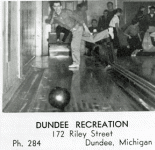 There
was a small movie theater in town during the 1950s where you could see a
double feature, have popcorn, candy and a coke for around 50 cents. A
Veterans of Foreign Wars hall on the east side of town held Friday night
fish fries and hosted wedding receptions. Each year a summer carnival with
rides and games was held on their property. Little league baseball games
were held on another part of the VFW land and at a larger field which was
located on the east side of town. There
was a small movie theater in town during the 1950s where you could see a
double feature, have popcorn, candy and a coke for around 50 cents. A
Veterans of Foreign Wars hall on the east side of town held Friday night
fish fries and hosted wedding receptions. Each year a summer carnival with
rides and games was held on their property. Little league baseball games
were held on another part of the VFW land and at a larger field which was
located on the east side of town. |
 |
|
 |

 Dundee
High School was established on the corner of Adams and
Ypsilanti Streets in the early part of the 20th century. At
that time, most students went to small rural schools through the
8th grade. To go on to high school, they would have to be
able to make their own way into town each day.
For instance when my mother, Mildred (Roggerman) Heiden graduated in 1931,
there were only 28 students in her class and most of them lived in town. Dundee
High School was established on the corner of Adams and
Ypsilanti Streets in the early part of the 20th century. At
that time, most students went to small rural schools through the
8th grade. To go on to high school, they would have to be
able to make their own way into town each day.
For instance when my mother, Mildred (Roggerman) Heiden graduated in 1931,
there were only 28 students in her class and most of them lived in town.
In the late 1940s, Dundee Community Schools,
known as the Vikings, was established. This consolidated many one room
schools throughout Dundee Township and much of Raisinville Township into one
system. Students from rural areas were then bussed into town for the school
day. Large numbers of children from the Heiden and other families got their
education in Dundee.
|
 |
|
 |
|
 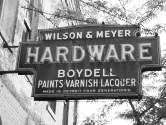 Downtown
Dundee had many small shops including a couple of hardware stores, clothing stores, Weyher's meat market, Kroger store, bank,
Stuwe's Pharmacy, Coffee Cup restaurant and several of what we used to call
"Beer Gardens". The Dairy Bar, Tastee Freeze and Mitchell's were favorite
spots for ice cream and snacks. In the early 1950s, there was a Detroit
Edison store where you could take your worn out light bulbs and trade them
in for free new ones. It was located next to the candy store run by an old
couple named Moore. The post office was a few doors down the street. Downtown
Dundee had many small shops including a couple of hardware stores, clothing stores, Weyher's meat market, Kroger store, bank,
Stuwe's Pharmacy, Coffee Cup restaurant and several of what we used to call
"Beer Gardens". The Dairy Bar, Tastee Freeze and Mitchell's were favorite
spots for ice cream and snacks. In the early 1950s, there was a Detroit
Edison store where you could take your worn out light bulbs and trade them
in for free new ones. It was located next to the candy store run by an old
couple named Moore. The post office was a few doors down the street. |
 |
|
 |
|
 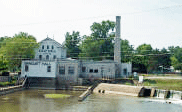 Dundee
is located on the banks of the River Raisin. In the early 1800s, a makeshift
dam was build on the river and a grist mill was built on the south bank.
This expanded and changed over the decades to a large building that has been
home to several industries and is now a major museum and banquet facility
for the community. Dundee
is located on the banks of the River Raisin. In the early 1800s, a makeshift
dam was build on the river and a grist mill was built on the south bank.
This expanded and changed over the decades to a large building that has been
home to several industries and is now a major museum and banquet facility
for the community. |
 |
 |
|
|
|
|



